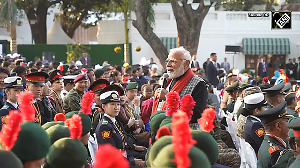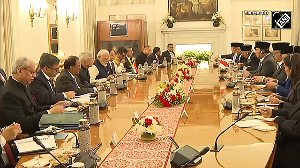Developing countries, including India and Brazil, attribute the failure of the WTO mini-ministerial in Geneva to the rigid stance taken by United States on the issue of market access.
'The contention of the US was that even the offer that it had tabled in Hong Kong for binding its domestic support to $22 billion (against an applied domestic support of $19 billion) would be contingent on its getting increased market access,' a senior commerce ministry official said.
Officials said the US was keen to re-negotiate the issue of Special Products that gives leverage to developing countries to protect their farmers.
'The US was largely isolated at the talks as even the EU had agreed to accept the G-20 proposal to cut import tariffs on farm products by 51 per cent, as against its earlier offer of 39 per cent,' an official said.
With Commerce and Industry Minister Kamal Nath and Brazilian Foreign Minister Celso Amorim taking the lead, there was 'unprecedented solidarity' among developing countries which emphasised they should not be expected to pay a price to eliminate distortions by industrialised nations that affect global trade on farm products.
Officials said the WTO Director General Pascal Lamy had now been asked to to evolve a common ground through individual discussions with key players of India, Brazil, US, EU, Australia and Japan.
Do you want to discuss stock tips? Do you know a hot one? Join the Stock Market Investments Discussion Group







 © 2025
© 2025